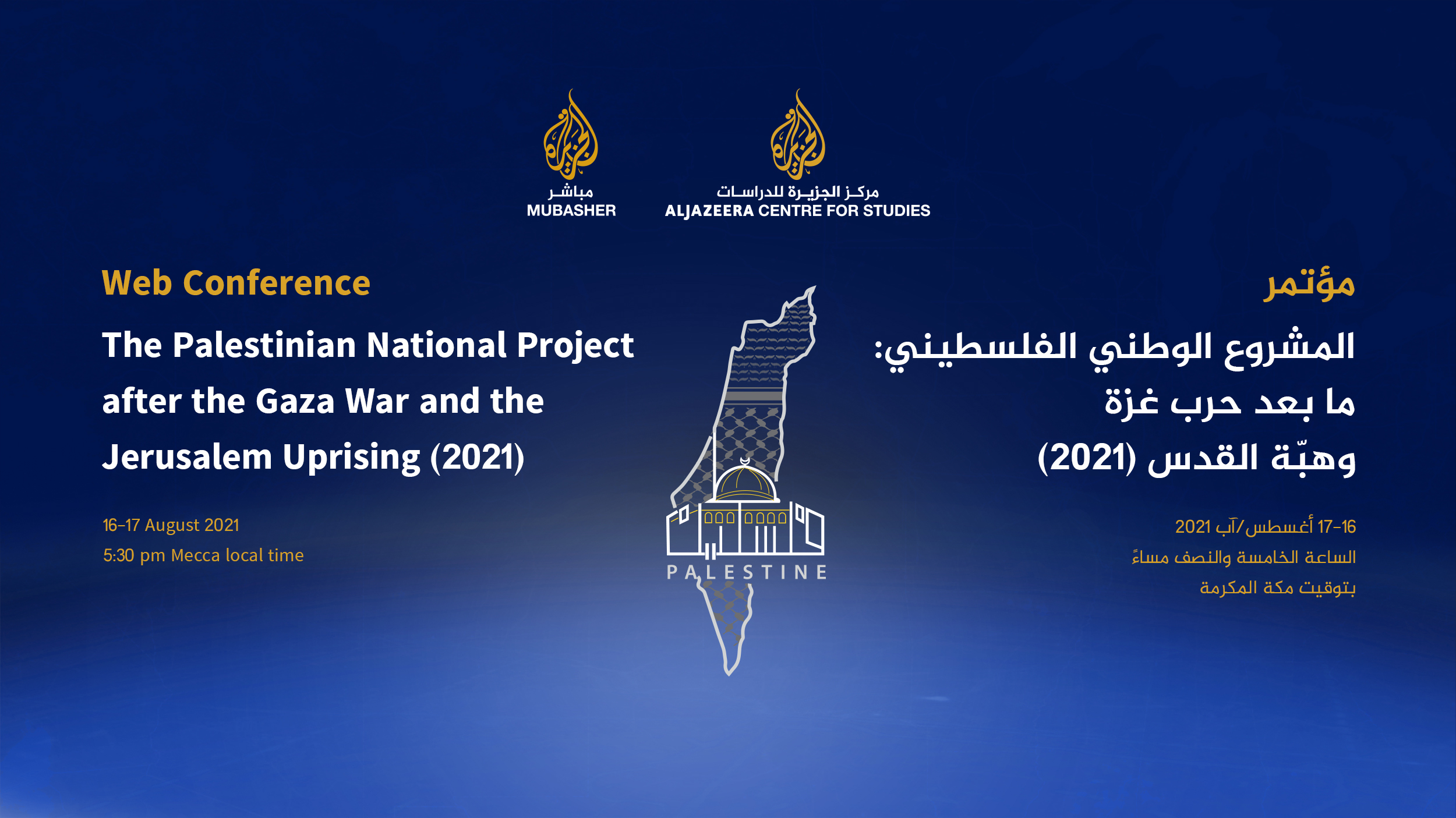
Al Jazeera Centre for Studies and Al Jazeera Mubasher are organizing a conference entitled, “The Palestinian National Project after the Gaza War and the Jerusalem Uprising (2021),” set to take place on Monday and Tuesday, 16 and 17 August 2021 with the participation of researchers and academics specializing in Palestinian and Israeli affairs. The conference will be broadcast at 5:30 pm Mecca local time on Al Jazeera Mubasher and live-streamed on Al Jazeera Centre for Studies’ digital platforms.
The conference aims to review and re-evaluate the Palestinian national project in light of the Jerusalem uprising and the recent war on Gaza. It will discuss the options available to the Palestinian people after the two-state solution faced several setbacks, the last one being former US president Donald Trump’s announcement of the “deal of the century,” which prompted doubts about the effectiveness of the Oslo Accords and the level of commitment to it. In addition, the West Bank is experiencing the expansion of Israeli settlements as well as the Judaization of Jerusalem, which was declared the eternal capital of Israel, and which only defers the final solution.
Participants will look into whether the military resistance project, which is now based in Gaza, was able in the recent battle to present a model combining military resistance with other means all over Palestine.
In addition, the conference will discuss the Palestinian interior, especially with its hopes for integration while maintaining exclusiveness have disappeared with Israel’s insistence on the Jewishness of the state, constant pursuit of displacing Palestinians, and challenging of the legality of their presence on their land.
At the regional and international levels, the conference will shed light on the position of the Palestinian cause in regional and international agendas, especially with the new realities that have overridden the Oslo Accords and the foundations on which the peace process was established in 1990. In addition, several Arab countries have disregarded the Arab initiative and become more accepting of the normalisation of relations with Israel, albeit at varying degrees.
Given all of these reasons and the stages that the Palestinian cause has previously gone through – the liberation of all Palestinian territories through military struggle in the first, and land for peace in the second – the Palestinian cause finds needing to re-examine and reconsider the Palestinian national project in light of new realities, which is what the conference aims for over the course of four sessions.
Sessions
Day One
Session One: 17:30-18:45
The Palestinian National Project: Review and Reassessment
How does the Palestinian national project, which was based first on liberation through resistance and then on settlement and the peace process in Oslo, look like? What remains of it? What mistakes were made? Can it be reformed or revived?
Speakers:
- Ibrahim Fraihat, Associate Professor in International Conflict Resolution at the Doha Institute for Graduate Studies and a member of the Palestine Academic Group
- Salman Abu Sitta, President of the Palestine Land Society
- Ilan Pappe, Director of the European Centre for Palestine Studies
- Mohamed Jamil Ould Mansour, Former Chairman of the National Rally for Reform and Development in Mauritania (Tewassoul)
Session Two: 19:00-20:30
Between one state and two states
Recently, the proposal of the one state option has been reinforced by some Palestinians, becoming a topic of discussion more than ever before, especially after the Trump administration’s adoption of the deal of the century. In addition, the two-state option is deteriorating because of Israeli policies such as the Judaization of the state. This session will discuss both of these options in light of the courses awaiting the Palestinian cause and explore whether there are other options.
Speakers:
- John Alderdice, Director of the Centre for the Resolution of Intractable Conflict (CRIC) at University of Oxford and a member of the House of Lords
- Ghada Karmi, lecturer at the University of Exeter
- Mustafa Barghouti, General Secretary of the Palestinian National Initiative
- Adnan Abu Amer, Professor of Political Science at the University of the Ummah in Gaza
Day Two
Session Three: 17:30-18:45i
The Palestinian National Project and Domestic and Foreign Challenges
The Palestinian cause faces various challenges that prevent a Palestinian consensus on a clear and defined Palestinian project or hinder the consolidation of one, such as: Israel’s imposition of new realities on the ground, preventing any real solution to the final issues of conflict such as the refugees and Jerusalem; the normalisation of relations by some Arab countries in a context separate from the Palestinian cause; the continued separation of Gaza and the West Bank; and ongoing Palestinian-Israeli confrontation.
Speakers:
- Mohsen Saleh, General Manager of Al-Zaytouna Centre for Studies and Consultation
- Osama Abuirshaid, Executive Director of American Muslims for Palestine
- Sari Orabi, writer and researcher specialising in Arab and Islamic affairs, particularly the Palestinian national movement, and Director of Al Quds Centre for Studies in Ramallah
- Antoine Shalhat, researcher on Israeli affairs
- Fadwa Barghouti, Palestinian activist and wife of Palestinian leader Marwan Barghouti
Session Four: 19:00-20:30
The Palestinian Cause and Future Directions
This session discusses the courses that the Palestinian will take given what the Palestinian national project will lead to, taking into account the reality of the Palestinian Authority, the Palestine Liberation Organization and all the Palestinian factions on one hand and domestic, regional and international realities on the other.
Speakers:
- Nabil Amr, Palestinian writer and politician
- Jawad Al Hamad, Director of the Middle East Studies Center in Amman
- Hugh Lovatt, Senior Policy Fellow with the Middle East and North Africa Programme at the European Council on Foreign Relations
- Majed al-Zeer, Deputy Chairman of the Palestine Abroad Conference